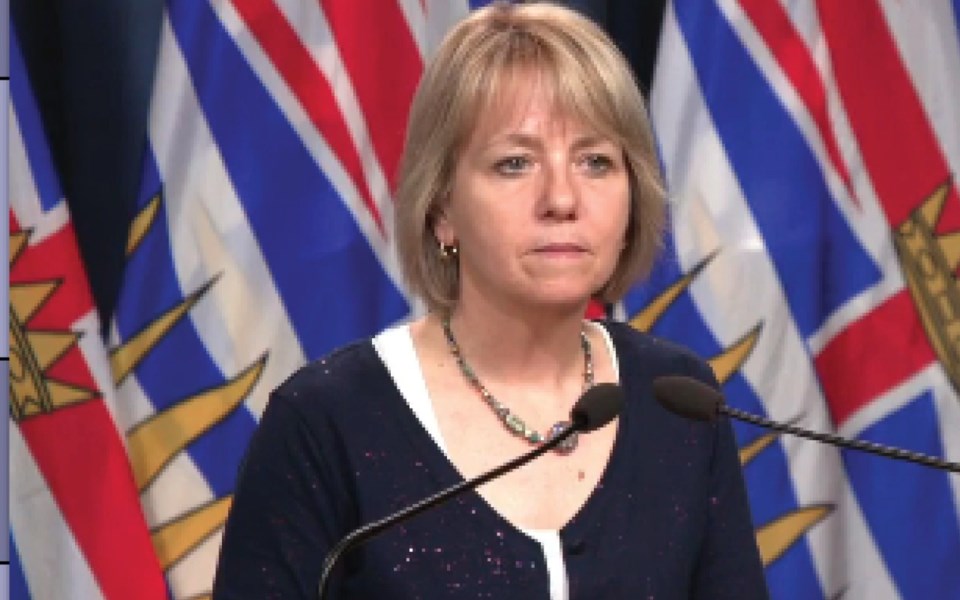There are now 2,053 cases of the coronavirus (COVID-19) in B.C., after health officials announced 55 new cases Tuesday.
Provincial health officer Dr. Bonnie Henry reports that there are 803 cases in Vancouver Coastal Health (VCH), 918 in Fraser Health, 119 on Vancouver Island, 168 in Interior Health and 45 in Northern Health.
There have been no new outbreaks in long-term care facilities. Currently, there are 20 active outbreaks in long-term facilities and three acute care unit outbreaks in the Vancouver Coastal Health and Fraser Health regions. A total of 391 people in these facilities have tested positive. Outbreaks are declared over at 12 care facilities.
The outbreak at the Mission federal correctional institute in the Fraser Valley continues to grow with two new cases. Now, there are 120 cases that are positive for COVID-19.
Forty-six of the cases are related to the ongoing outbreak at Superior Poultry, a chicken processing plant in Coquitlam. Meanwhile, the number of positive cases related to the initial outbreak announced earlier this week at United Poultry Company Ltd., a Vancouver processing plant, remains steady at 34.
Eleven cases connected to the Kearl Lake project in Alberta, have been confirmed to date, Henry added. However, she notes that there are several hundred people associated with the project, and that anyone who has been in the project since March 24 needs to self-isolate. In addition, she mentioned that the health authority has been given a list of names of individuals connected to the facility that they are contacting.
There have been an additional two deaths, for a total of 105 fatalities in the province.
There are currently 94 people in acute care in hospital with 37 of those in critical care.
So far 1,231 people have fully recovered and are no longer in isolation, Henry said.
Today is the National Day of Mourning, which Henry noted is a time to honour those who have lost their lives at work, or had their lives changed forever due to a workplace injury or illness.
"May I remind everybody how important it is to have good health and safety conditions in our workplaces, and that everyone deserves a safe workplace, as well as a safe home and a safe community," said Henry.
Henry added that the health authority uses science to determine what the best ways to break the chains of transmission of COVID-19 are and that this process is ever-changing as they learn more about the virus. With that said, she acknowledged that the restrictions have a major financial, social, emotional and health impacts on everyone. As such, she noted that researchers are trying to find the delicate balance where governments can safely begin to re-open businesses.
"What you do, does and will continue to make a difference in the days and weeks ahead," said Henry.
Yesterday, Henry stated that despite a number of community outbreaks, the decrease in cases is clear evidence that the sustained efforts to follow public health measures has slowed the rate of transmission of COVID-19.
"In addition, our increased surveillance testing has led us to find people in our community who are postive for COVID-19 and the vast majority of them our linked to outbreaks now, which is an important thing for us to understand so that we know where transmission is happening in our community," Henry said.
On Saturday, Henry raised the issue of domestic violence in the age of physical distancing. While staying home is the best method to bend the COVID-19 curve, she said, "In many cases this has led to increased family stresses and a decrease in community connections. Unfortunately, for some being at home means not being safe," she said, adding that domestic violence is known to, potentially, increase during a crisis like the ongoing pandemic.
"If you are experiencing violence, it's not OK," Henry said. "We want you to know that you are not alone, there are resources out here, that we have, that are available for you." She urged those in immediate danger to call 911, and also cited VictimLinkBC as a toll-free, confidential resource available 24 hours a day.
- With files from Megan Lalonde.




